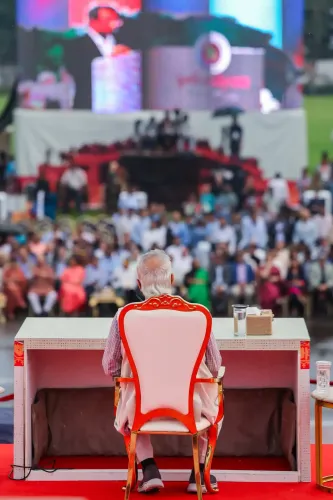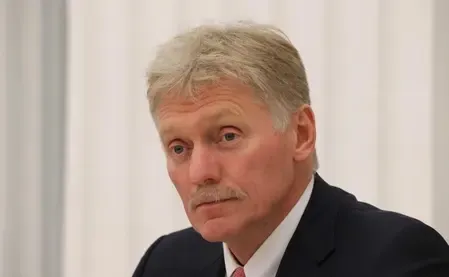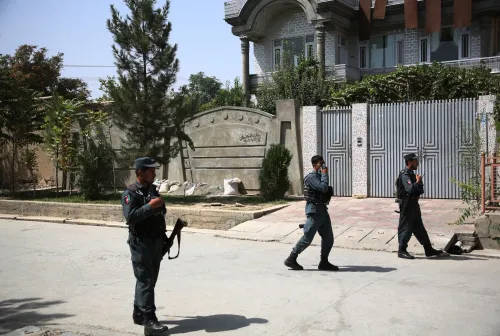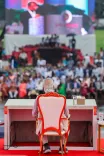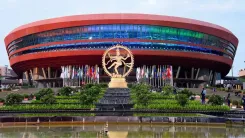How would Russia respond to a Tomahawk strike?
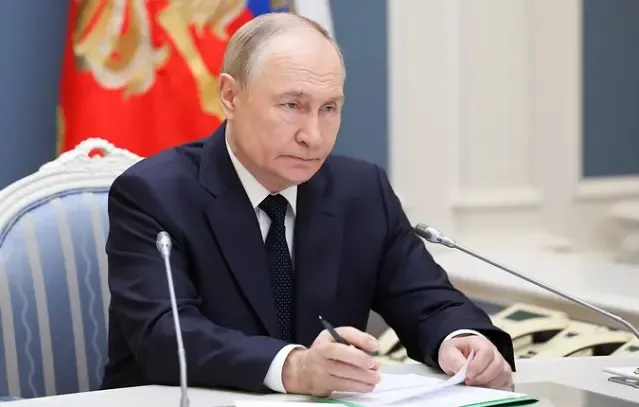
Synopsis
Key Takeaways
- The potential for a serious Russian response to Tomahawk strikes.
- The complexities of US-Russian relations amidst ongoing sanctions.
- The importance of dialogue in resolving international conflict.
- The strategic capabilities of Tomahawk missiles.
- Putin's commitment to diplomacy despite rising tensions.
Moscow, Oct 24 (NationPress) Russian President Vladimir Putin has declared that a Tomahawk missile strike on Russian soil would elicit a response that is serious, if not overwhelming.
While the US has not sanctioned the use of these missiles by Ukraine, Putin remarked that Kyiv's efforts to acquire permission signify an escalation. He stated, "If such weapons are deployed against Russian territory, our response will be very serious, if not overwhelming. They should consider that."
Putin also reiterated his commitment to maintaining dialogue despite US President Donald Trump canceling a proposed summit.
The Russian leader elaborated on the canceled meeting with Trump, which had been scheduled to occur in Budapest, Hungary, in the upcoming weeks.
Stressing the necessity of ongoing diplomacy to resolve the Ukraine conflict, Putin asserted, "Dialogue is always preferable to confrontation, disputes, or war." He highlighted, "We have consistently supported dialogue and continue to do so now."
Putin pointed out that it would be a misstep for both him and the US President to approach the meeting casually and leave without achieving expected outcomes, noting that the summit was initially proposed by the US.
He dismissed recent US sanctions aimed at Russia's oil sector as ineffective, characterizing them as an attempt to pressure Moscow into submission.
"No self-respecting nation acts under duress," Putin stated, following the imposition of extensive restrictions on Rosneft and Lukoil, Russia's primary oil producers.
These sanctions were announced after the Kremlin rejected calls for an immediate cessation of hostilities in the ongoing conflict with Ukraine.
Earlier, US Special Envoy for Ukraine Keith Kellogg mentioned that Washington was considering supplying Tomahawk cruise missiles to Ukraine in response to a request from Ukrainian President Volodymyr Zelensky.
The Tomahawk is a long-range, subsonic cruise missile designed for precise strikes against terrestrial targets, boasting an operational range of approximately 1,600–2,500 km.
It can be adapted as a strategic weapon with a nuclear payload, although it is frequently used in its conventional form for tactical engagements.
Typically launched from ships or aircraft, Tomahawks are programmed with target coordinates, routing, flight paths, and digital terrain maps prior to launch. Strategic launch platforms also upload arming codes, allowing the missile to navigate utilizing a combination of inertial and satellite navigation.
Putin warned Trump that the sanctions could disrupt global energy markets and escalate oil prices worldwide, stating, "This will undoubtedly affect global oil prices, including those in the US."
Despite the seriousness of the latest US sanctions targeting two major oil firms, Putin claimed they would not significantly harm the economy.
He described the sanctions as an unfriendly act that does not enhance Russia-US relations, which had only recently begun to improve.
Trump had initially sought to strengthen ties with Russia at the beginning of his presidency but has grown increasingly frustrated with Putin's reluctance to agree to a ceasefire, lamenting that their peace negotiations were not progressing.
Although Trump had refrained from imposing new sanctions for months, his patience wore thin after discussions for a new summit with Putin in Budapest fell through.
Nonetheless, even after the introduction of new sanctions and the postponement of the summit, Putin appeared open to continued dialogue.
The US Treasury Department stated that the measures were aimed at limiting Russia’s ability to finance its aggression.
Ukrainian President Volodymyr Zelensky welcomed the sanctions, asserting that they would weaken the Kremlin's capacity to wage war.
The Russian Foreign Ministry labeled the US sanctions against two Russian oil companies as counterproductive and emphasized that Moscow possesses strong immunity against Western sanctions.
Commenting on the measures against Lukoil and Rosneft, Russian Foreign Ministry spokeswoman Maria Zakharova stated, "We view this action as entirely counterproductive," according to Russia's leading Tass news agency.
Zakharova's remarks followed Trump's implementation of new sanctions targeting Russia's two largest oil firms in his latest effort to resolve the conflict in Ukraine.
During a meeting with NATO Secretary General Mark Rutte at the White House, Trump expressed hope that the war would be resolved.
He noted that his previous discussions with Putin had not yielded any significant breakthroughs, stating, "Every time I communicate with Vladimir, we have constructive conversations, yet they lead nowhere. He is engaged in a war. It's a conflict between two highly capable sides, and that's the nature of war. You can never predict its outcome, but I believe that it's time to reach an agreement."
On Tuesday, Trump canceled his planned meeting with Putin in Budapest, asserting he did not want to engage in a wasted meeting.
"We canceled the meeting with President Putin. It simply did not feel right to me. It did not seem like we would achieve what is necessary. Hence, I canceled it, but we will arrange it for the future," he remarked.

